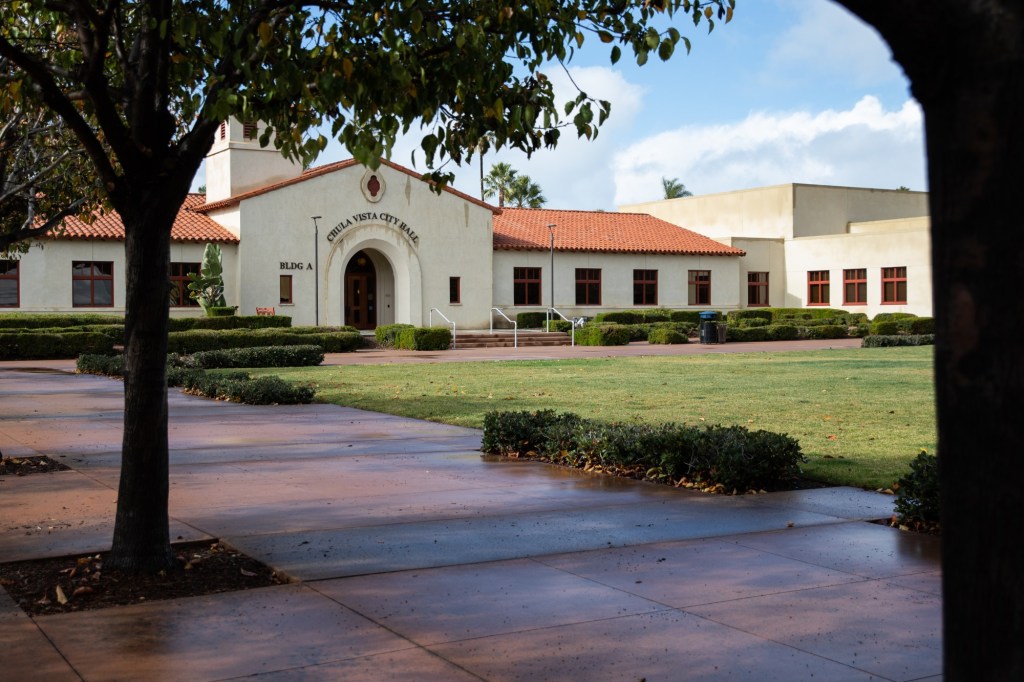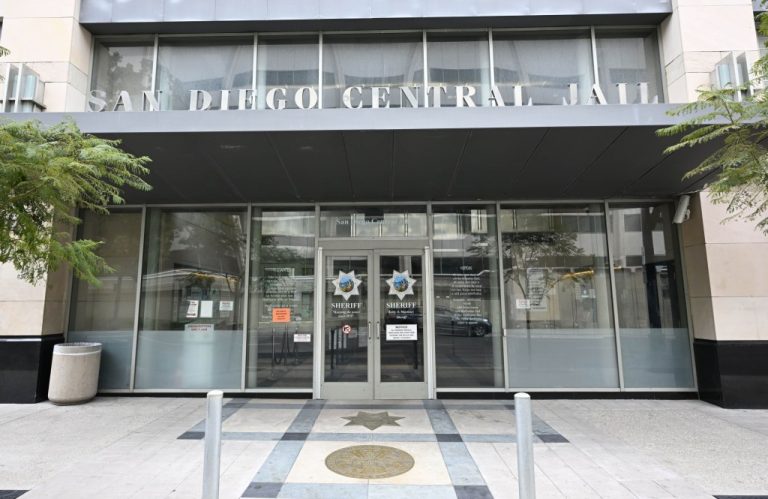

By her count, Laura Wilkinson Sinton has been losing $1 million a month – every month going back six years.
She complained to Chula Vista city officials when she was first passed over for cannabis licenses in 2019, saying the evaluation process was flawed. She was rebuffed and took her claim to court, where she prevailed time and again.
Even so, the city has not budged.
Nearly two years ago, a state appeals court rejected Chula Vista’s legal argument and ordered the city to award cannabis licenses to Wilkinson Sinton’s company, CV Amalgamated LLC, which does business under the name Caligrown.
But Chula Vista is still refusing to follow the appellate court order.
Now Wilkinson Sinton is back in court, pleading with a judge to compel city officials to enforce the ruling.
“It shocks the conscience that six years later they are fighting this still,” the Coronado entrepreneur said. “And now we are suing for discrimination and violating my civil rights and damages to my reputation and my business.”
City Attorney Marco Verdugo declined to comment on the court filing. Nor would he discuss the city’s legal strategy – or how much money they spent, and continue to spend, on outside lawyers to defend their position.
“The City does not comment on active litigation,” he said via email Friday.
Council members are scheduled to discuss the lawsuit among themselves, however. The CV Amalgamated case is on the public agenda for a closed-door review during the Tuesday council meeting.
It is not clear whether the city will take any action to end the case – or push forward with it.
Wilkinson Sinton first applied for storefront retail cannabis licenses in Districts 1, 3 and 4.
The applications were rejected even though her proposal scored higher than others. The lawsuit accuses the city of favoring other bids over hers and even issued one license to a company that did not submit an application.
“The city’s arbitrary, capricious and unlawful conduct was definitively exposed in the Court of Appeal’s published decision filed July 19, 2022,” the latest court filing states. “Incredibly, even after the decision, the city still did not score and rank CVA as required.”
One problem is that Chula Vista has now issued all of the permits that were initially allotted, although some licenses could be revoked or the city could opt to increase the number of licenses.
But under the current ordinance, the City Council can add more “only after receiving and considering a report from the City Manager regarding any observed or projected adverse impacts on the community from such businesses.”
Throughout the Wilkinson Sinton case, the council has made no such recommendation.
Newly elected Councilmember Michael Inzunza represents District 3, one of the districts in which Wilkinson Sinton hopes to open a storefront. He declined to comment Friday on whether he would generally support increasing the number of licenses, saying he could not speak “on any subject related to any case.”
Wilkinson Sinton offered to sit down with city officials and discuss a potential settlement in July.
In a letter to Alena Shamos, the city’s outside counsel, attorney David Demian said Caligrown would “waive its rights to recover costs and fees relating to this action and the parties can move forward as partners toward a better future” if storefront licenses were granted.
According to communications between the two attorneys, the city requested an extension through mid-August but city officials never met with Wilkinson Sinton to discuss a settlement.
“The city of Chula Vista does not cooperate,” Wilkinson Sinton said.
The licenses to operate legal marijuana dispensaries can be hugely profitable due to the limited number of shops. Wilkinson Sinton said her analysis of publicly released tax data show that she would have been earning an average of $12 million a year if her licenses had been approved.
“Their established pattern of malfeasance and treatment of me (is) vastly different than any other applicant,” she said.
Wilkinson Sinton said Chula Vista city officials are punishing her for raising questions about former Councilmember Andrea Cardenas, who resigned in midterm last year after she was charged with multiple felonies related to a federal COVID-19 relief claim.
Cardenas and her brother, the political consultant Jesus Cardenas who ran his sister’s winning campaign in 2020, later pleaded guilty to a single felony each. When they were sentenced last year, they both received probation.
Grassroots Resources, the consulting firm Jesus Cardenas founded, also represented several cannabis clients, according to statements of economic interest that Jesus Cardenas filed while he worked as chief of staff to San Diego Councilmember Stephen Whitburn.
Jesus Cardenas stepped away from his San Diego city job after The San Diego Union-Tribune reported that he was running his outside consultancy while working for Whitburn – and helping to set policy on cannabis. The firm also was suspended by the state Franchise Tax Board.
Andrea Cardenas resigned her seat on the Chula Vista City Council early last year.
While Chula Vista has its own elected city attorney, the council has approved hiring outside law firms to defend CV Amalgamated LLC case – and other litigation in which Chula Vista has seen repeated setbacks but refused to change course.
Also on the closed-session agenda Tuesday is an update on a lawsuit filed by Arturo Castañares, who sued Chula Vista in 2021 over the city’s resistance to releasing any video footage from police drones.
The lawsuit, which is broadly considered a test case for police agencies across the state and their obligations under the California Public Records Act, sought copies of police videos that are routinely collected as part of the department’s law enforcement activities.
But instead of releasing any of the Chula Vista police footage, the city argued that all of the material was exempted from public release under the state open-records law.
Even though the legal argument proved unsuccessful, the city litigated the case all the way to the state Supreme Court. The high court rejected the case last spring but Chula Vista has yet to comply with the initial public-records request.
“It’s hard to know how they are serving the taxpayers at this point,” said attorney Cory Briggs, who represents Castañares in the police drone-footage case. “We offered to settle for them releasing any two (out of more than 300) clips and they still refuse.
“It seems they’re content to spend two dollars for each dollar they claim to want to save,” he said.
Wilkinson Sinton said she and her legal team have recently begun collaborating with other plaintiffs’ lawyers challenging Chula Vista in court. They are working together to help end what has turned into years of litigation that is likely to cost taxpayers millions of dollars.
“We are all talking at this point,” she said. “It’s unconscionable to waste taxpayers money for city shenanigans.”







